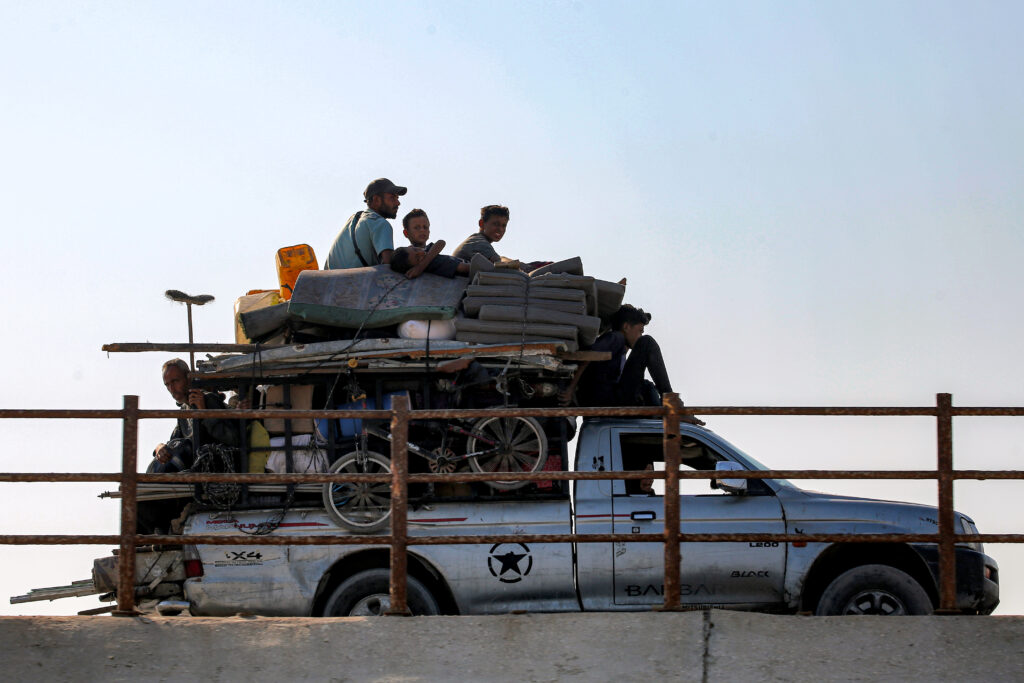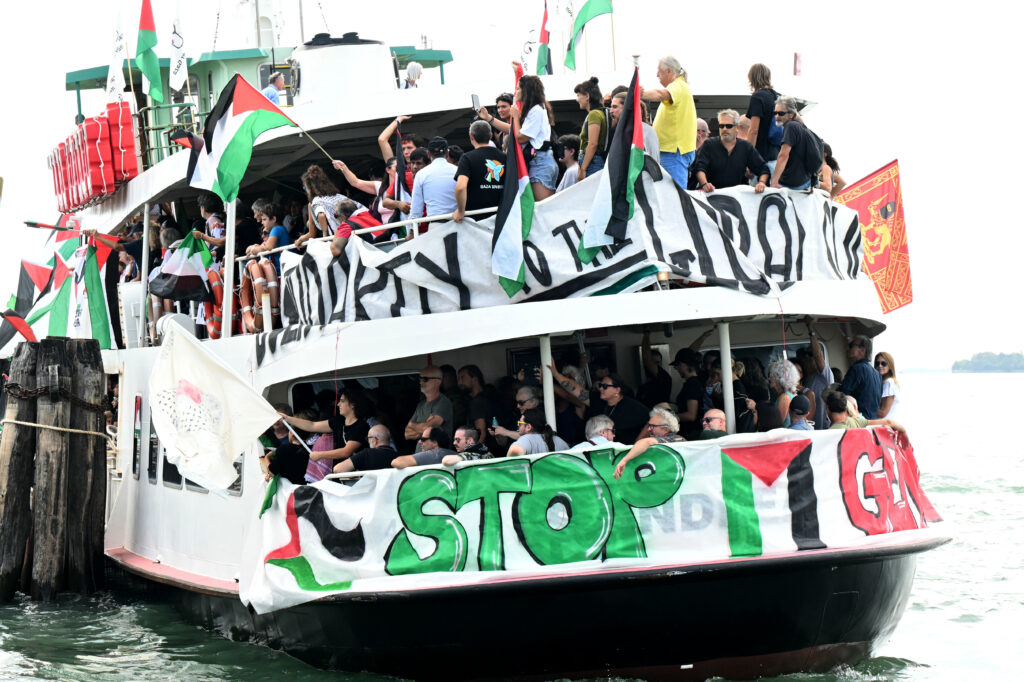AFP Asia Business
Red Cross warns against evacuation of Gaza City as Israel tightens siege
The Red Cross warned on Saturday that any Israeli attempt to evacuate Gaza City would put residents at risk, as Israel’s military tightened its siege on the area ahead of a planned offensive.Gaza’s civil defence agency said that since dawn Israeli attacks had killed 66 people in the territory already devastated by nearly 23 months of war.”It is impossible that a mass evacuation of Gaza City could ever be done in a way that is safe and dignified under the current conditions,” International Committee of the Red Cross President Mirjana Spoljaric said in a statement. The dire state of shelter, healthcare and nutrition in Gaza meant evacuation was “not only unfeasible but incomprehensible under the present circumstances”. Israel is under increasing pressure to end its offensive in Gaza where the great majority of the population has been displaced at least once and the United Nations has declared a famine.But despite the calls at home and abroad for an end to the war, the Israeli army is readying itself for an operation to seize the Palestinian territory’s largest city and relocate its inhabitants. On Saturday, at a rally in Tel Aviv demanding the negotiated release of the remaining Israeli hostages held in Gaza, captives’ families warned the impending offensive could imperil their lives. The Israeli military has declared Gaza City a “dangerous combat zone”, without the daily pauses in fighting that have allowed limited food deliveries elsewhere.The military did not call for the population to leave immediately, but a day earlier COGAT, the Israeli defence ministry body that oversees civil affairs in the Palestinian territories, said it was making preparations “for moving the population southward for their protection”.- ‘Shaken the earth’ -Gaza’s civil defence spokesman Mahmud Bassal told AFP 66 people had been killed in Israeli bombing since dawn.The army did not immediately respond to a request for comment on the figure.Media restrictions in Gaza and difficulties in accessing many areas mean AFP is unable to independently verify the tolls and details provided by the civil defence agency or the Israeli military.Bassal said 12 people were killed when an Israeli air strike hit “a number of displaced people’s tents” near a mosque in the al-Nasr area, west of Gaza City.The army did not immediately respond to a request for comment. Umm Imad Kaheel, who was nearby at the time, said children were among those killed in the strike, which had “shaken the earth”.”People were screaming and panicking, everyone running, trying to save the injured and retrieve the martyrs lying on the ground,” the 36-year-old said.The civil defence agency said 12 people were killed by Israeli fire as they waited near food distribution centres in the north, south and centre.A journalist working for AFP on the northern edge of Gaza City reported he had been ordered to evacuate by the army, adding conditions had become increasingly difficult, with gunfire and explosions nearby. Abu Mohammed Kishko, a resident of the city’s Zeitoun neighbourhood, told AFP the bombardments the previous night had been “insane”.”It didn’t stop for a second, and we didn’t sleep all night,” the 42-year-old said.- Fears for hostages – The government’s plans to expand the war have also drawn opposition inside Israel, where many fear they will jeopardise the lives of the remaining hostages.The Israeli prime minister’s office said on Saturday the remains of the second of two hostages recovered from Gaza this week have been identified as belonging to the student Idan Shtivi.The Hostages and Missing Families Forum campaign group said the return of Idan Shtivi’s body represented “the closing of a circle and fulfils the State of Israel’s fundamental obligation to its citizens”.Einav Zangauker, mother of hostage Matan Zangauker, told the Tel Aviv rally that if Prime Minister Benjamin Netanyahu “chooses to occupy the Gaza Strip instead of the current outline for a deal, it will be the execution of our hostages and dear soldiers”.Earlier in August, Hamas agreed to a framework for a truce and hostage release deal but Israel has yet to give an official response. The Israeli army, whose troops have been conducting ground operations in Zeitoun for several days, said two of its soldiers had been wounded by an explosive device “during combat in the northern Gaza Strip”.It also said it had “struck a key Hamas terrorist in the area of Gaza City” without elaborating on the identity of the target. Hamas’s October 2023 attack, which triggered the war, resulted in the deaths of 1,219 people, mostly civilians, according to an AFP tally based on Israeli figures.Of the 251 hostages seized during the attack, 47 are still being held in Gaza, around 20 of whom are believed to be alive.Israel’s retaliatory offensive has killed at least 63,371 Palestinians, most of them civilians, according to figures from the health ministry in Hamas-run Gaza that the United Nations considers reliable.
Gaza aid flotilla ‘should not have to exist’ says Thunberg
Aid flotillas like the one preparing to leave for Gaza would not be necessary if governments upheld international law, rights activist Greta Thunberg told AFP Saturday.”It should not have to be up to us,” said the 22-year-old Swedish campaigner, who will join the flotilla when it sets off from Barcelona on Sunday.”A mission like this should not have to exist,” she added.”It is the responsibility of countries, of our governments and elected officials to act to try to uphold international law, to prevent war crimes, to prevent genocide,” she said.”That is their legal duty to do. And they are failing to do so. And thereby betraying Palestinians but also all of humanity.”The latest aid expedition towards Gaza is organised by a group called the Global Sumud Flotilla, which describes itself as an “independent” organisation. Sumud is the Arab word for perseverance.They say that boats from ports around the world will converge on Gaza in a peaceful bid to open a humanitarian corridor.”Our aim is to get to Gaza, to deliver the humanitarian aid, announce the opening of a humanitarian corridor and then bring more aid, and then thus also ending, breaking Israel’s illegal and inhumane siege on Gaza,” said Thunberg.Brazilian activist Thiago Avila told journalists in Barcelona: “This will be the largest solidarity mission in history, with more people and more boats than all previous attempts combined.” Two attempts by activists to deliver aid by ship to Gaza, in June and July, were blocked by Israel.Troops boarded their vessels and detained the activists, bringing them ashore in Israel before expelling them. Thunberg was among the 12 activists on board the June flotilla.The organisers of this latest flotilla have not said exactly when they are setting off, nor how many boats will leave from Barcelona.The UN on August 22 declared a famine in Gaza, blaming Israel’s “systematic obstruction” of aid, sparking furious denials from the Israeli authorities.
Thousands protest Israeli siege of Gaza near Venice Film Festival
Thousands of people protested Saturday against Israel’s siege of Gaza on the sidelines of the Venice Film Festival, seeking to move the spotlight from movie drama to real-world trauma.Organised by left-wing political groups in northeast Italy, the demonstration began in the early evening a few kilometres from the festival where top Hollywood talent from George Clooney and Julia Roberts to Emma Stone have walked the red carpet in recent days. The protesters, whose numbers AFP reporters estimated to be about three to four thousand, marched slowly to the entrance of the festival in the beachfront Lido district, waving Palestinian flags, as the Hollywood blockbuster “Frankenstein” was due to have its world premiere nearby.”You are all an audience to genocide” read one sign.Protesters said the film industry should use its public platform at Venice — the world’s oldest film festival whose movies often go on to Oscar glory — to focus attention on Gaza. “The entertainment industry has the advantage of being followed a lot, and so they should take a position on Gaza,” Marco Ciotola, a 31-year-old computer scientist from Venice, told AFP at the rally.”I don’t say that everyone needs to say ‘genocide’, but at least everyone needs to take a position, because this is not a political situation. This is a human situation.””We all know what is happening and it’s not possible that it carries on,” said Claudia Poggi, a teacher holding a Palestinian flag as people shouted “Stop the Genocide!” and “Free Palestine”.The Gaza war was one of the main talking points in the lead-up to the festival due to an open letter denouncing the Israeli government and calling on the festival to speak out against the war more forcefully. The letter, drafted by a group called Venice4Palestine, has garnered more than 2,000 signatures from film professionals, including “Frankenstein” director Guillermo del Toro, according to organisers.A similar initiative was organised at the Cannes Film Festival in May.”The objective of the letter was to bring Gaza and Palestine to the core of the public conversation in Venice,” Venice4Palestine co-founder and director Fabiomassimo Lozzi told AFP.”We are amazed at the amount of reaction,” he added.”It was like people in our business were just waiting for someone to raise our voice.”- Boycott -On the same day just blocks away on the red carpet, “Frankenstein” stars Oscar Isaac and Jacob Elordi posed for the paparazzi and signed autographs.The Netflix-produced film is one of 21 movies in the main competition vying for the festival’s top prize, the Golden Lion.On the red carpet Friday, Moroccan filmmaker Maryam Touzani held up a sign saying “Stop the Genocide in Gaza.” She told AFP it was “essential that we make our voices heard.” “I want every person to be able to speak out on this. And raise their voice. And make their voice heard,” she said, calling what was going on in Gaza “an attack on humanity.”The festival has said it would not disinvite actors who have supported Israeli’s actions in Gaza, as the collective had asked it to do for Israeli actor Gal Gador and Britain’s Gerard Butler — who regardless were not expected to attend the festival. Venice4Palestine’s Lozzi defended the proposed boycott.”I believe that it’s justified in the same way I believed about 40 years ago that it was justified boycotting artists who performed in South Africa at the height of the apartheid system,” he said.The controversy over Gaza is not expected to end soon. Next week will see the premiere of “The Voice of Hind Rajab”, set in Gaza, by Tunisian director Kaouther Ben Hania, in the main competition. Actors Brad Pitt and Joaquin Phoenix, and directors Alfonso Cuaron and Jonathan Glazer, have joined the movie as executive producers, according to film business news outlet Deadline.It tells the true story of a six-year-old Palestinian girl killed in January 2024 by Israeli forces alongside six family members while trying to flee Gaza City.Israel invaded Gaza nearly two years ago and has killed at least 63,025 Palestinians, most of them civilians, according to figures from the health ministry in Hamas-run Gaza that the UN considers reliable.The United Nations has declared a famine in the territory caused by Israel’s blockade on the territory of nearly two million people.The war was sparked by the October 2023 attack by Hamas on Israel which resulted in the deaths of 1,219 people, mostly civilians, according to an AFP tally based on Israeli figures.
Thousands protest Israeli siege of Gaza near Venice Film Festival
Thousands protested Saturday against Israel’s siege of Gaza on the sidelines of the Venice Film Festival, seeking to move the spotlight from movie drama to real-world trauma.Organised by left-wing political groups in northeast Italy, the demonstration began in the early evening a few kilometres from the festival where George Clooney, Julia Roberts and Emma Stone have walked the red carpet in recent days.”The entertainment industry has the advantage of being followed a lot, and so they should take a position on Gaza,” Marco Ciotola, a 31-year-old computer scientist from Venice, told AFP at the rally.”I don’t say that everyone needs to say ‘genocide’, but at least everyone needs to take a position, because this is not a political situation. This is a human situation.””We all know what is happening and it’s not possible that it carries on,” said Claudia Poggi, a teacher holding a Palestinian flag as people shouted “Stop the Genocide!” and “Free Palestine”.The Gaza war was one of the main talking points in the lead-up to the festival due to an open letter denouncing the Israeli government and calling on the festival to speak out against the war more clearly. The letter, drafted by a group called Venice4Palestine, has garnered more than 2,000 signatures from film professionals, including directors Guillermo del Toro and Todd Field, according to organisers.A similar initiative was organised at the Cannes Film Festival in May.”The objective of the letter was to bring Gaza and Palestine to the core of the public conversation in Venice and that is what has happened,” Venice4Palestine co-founder and director Fabiomassimo Lozzi told AFP.”We are amazed at the amount of reaction,” he added.”It was like people in our business were just waiting for someone to raise our voice.”- Boycott -The collective — but not the open letter — had also asked the festival to disinvite Israeli actor Gal Gadot and Britain’s Gerard Butler over their past support for the Israeli military.The festival has ruled out such a move — they are not expected in any case — but Lozzi defended the proposed boycott.”I believe that it’s justified in the same way I believed about 40 years ago that it was justified boycotting artists who performed in South Africa at the height of the apartheid system,” he said.Israel invaded Gaza nearly two years ago and has killed at least 63,025 Palestinians, most of them civilians, according to figures from the health ministry in Hamas-run Gaza that the UN considers reliable.The United Nations has declared a famine in the territory caused by Israel’s blockade on the territory of nearly two million people.The war was sparked by Hamas a October 2023 attack by Hamas on Israel which resulted in the deaths of 1,219 people, mostly civilians, according to an AFP tally based on Israeli figures.



